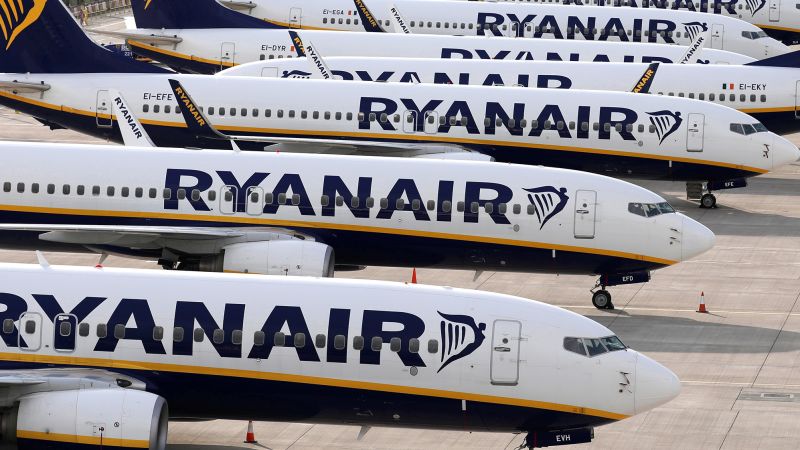Ryanair will start paying regular dividends for the first time in its nearly 40-year history, as Europe’s largest airline reaps record profits off the back of booming demand for air travel and much higher ticket prices.
The company, which also owns Polish airline Buzz and Austrian carrier Lauda, will return €400 million ($429.8 million) to shareholders via two equal payments next year and plans to distribute a quarter of annual profits going forward by way of ordinary dividends. The news helped send its shares nearly 7% higher Monday, taking this year’s gain to 33%.
Ryanair has returned money to investors in the past, but never on a regular basis. Between 2008 and 2020, the group paid out €6.74 billion ($7.2 billion) to shareholders via buybacks and ad hoc dividend payments, according to a spokesperson.
“Investors have lots to be cheerful about in this set of results, including (Ryanair’s) better-than-expected earnings, its outlook, and its dividend announcement,” Victoria Scholar, head of investment at Interactive Investor, an online investing platform, wrote in a note.
Ryanair (RYAAY) has benefited handsomely from resurgent travel demand following the pandemic, particularly as several rival carriers collapsed or made cuts to fleets and passenger capacity.
The Dublin-based airline flew 105.4 million passengers over the six months through September — an 11% increase on the same period last year, thanks to strong demand over Easter and record summer traffic.
Less competition has allowed the airline to increase ticket prices, which soared 24% on average, offsetting significantly higher fuel costs. The growth in ticket prices is set to moderate — Ryanair said fares for the October-to-December quarter were likely to be ahead of their year-ago levels by a “mid-teens percentage.”
“Ryanair has been able to pass on additional cost pressures to consumers… with ticket prices likely to continue to go up next year,” said Scholar.
That could attract increased scrutiny from regulators. The European Union’s transport commissioner, Adina Vălean, told the Financial Times in an interview published Monday that EU officials are probing a recent rise in air fares across Europe to determine “what is exactly going on in the market and why.”
The global aviation industry has recovered rapidly from a sharp downturn during the pandemic, when it racked up net losses of $183 billion. The International Air Transport Association said in June that it expects airlines globally to make $9.8 billion in net profit in 2023, more than doubling the forecast it had made six months prior.
Ryanair, for its part, continues to set new personal bests. The airline posted a record half-year profit of €2.18 billion ($2.3 billion) for the six months to September but said it expected “modest losses over the winter period.”
Still, it expects a full-year profit for the year to March 2024 in the range of €1.85 billion ($2 billion)—€2.05 billion ($2.2 billion). That would be up from its previous record of €1.45 billion ($1.6 billion) earned in 2018, before the Covid-19 pandemic.
“We are a very profitable airline but it’s a very modest profit at €10 per passenger, given the resources and the capital that we’ve invested in this business,” CEO Michael O’Leary said in a video posted on the company’s website.
Ryanair is showing few signs of slowing down, with plans to add more than 200 new routes over the next year, including its first flights to Albania this winter.
But O’Leary sounded a cautious note on its ambition to carry 183.5 million passengers over the 12 months ending in March 2024.
“I’m not sure whether we’ll hit that number. It depends on Boeing meeting some of their delivery commitments,” he said.
Ryanair agreed to buy up to 300 Boeing 737-10 planes earlier this year in a deal worth $40 billion.
It said Monday that up to 10 of 57 aircraft due for delivery before summer 2024 might be delayed until the following winter.
Read the full article here
